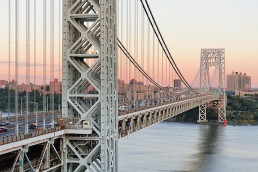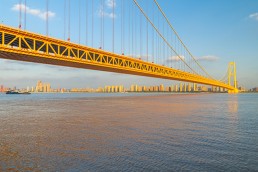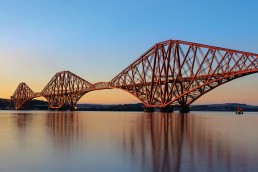© ATGImagesWilliamsburg Bridge 1903
Williamsburg Bridge 1903
The Bridge
The Williamsburg Bridge connects Brooklyn and Lower Manhattan in New York City, across the East River. It was opened twenty years after the Brooklyn Bridge, which is down river to the south west.
It now carries both rail lines and road vehicles, although originally carriages, rail and trolley lines were on the two decks. Additional support was added to the bridge to enable the expansion in vehicle use.
During the construction the separate cities of New York and Brooklyn were brought together as one, Greater New York, and the bridge became a key part of the physical link. It became another of the city’s iconic structures and a celebration of the use of steel, still a new material at that time and stronger and lighter than iron. The steel stiffening truss of both the deck and the towers are left exposed.
After decades with a lack of maintenance, a major refurbishment of the bridge was carried out in the 1990s.
Williamsburg Bridge
Stiffened-truss suspension bridge in New York City
Key Facts
Carries light rail, metro rail and road vehicles
Steel stiffened-truss suspension bridge
Location
New York, USA
Across the East River
Between Brooklyn and Manhattan
Designers / Engineers
Leffert L. Buck
Henry Hornbostel
Description
Steel suspension bridge
488m main span
2,227m total length
Main contractors
East River Bridge Co
John A Roebling Sons
Construction
Began in 1896
Opened 19 December 1903































































